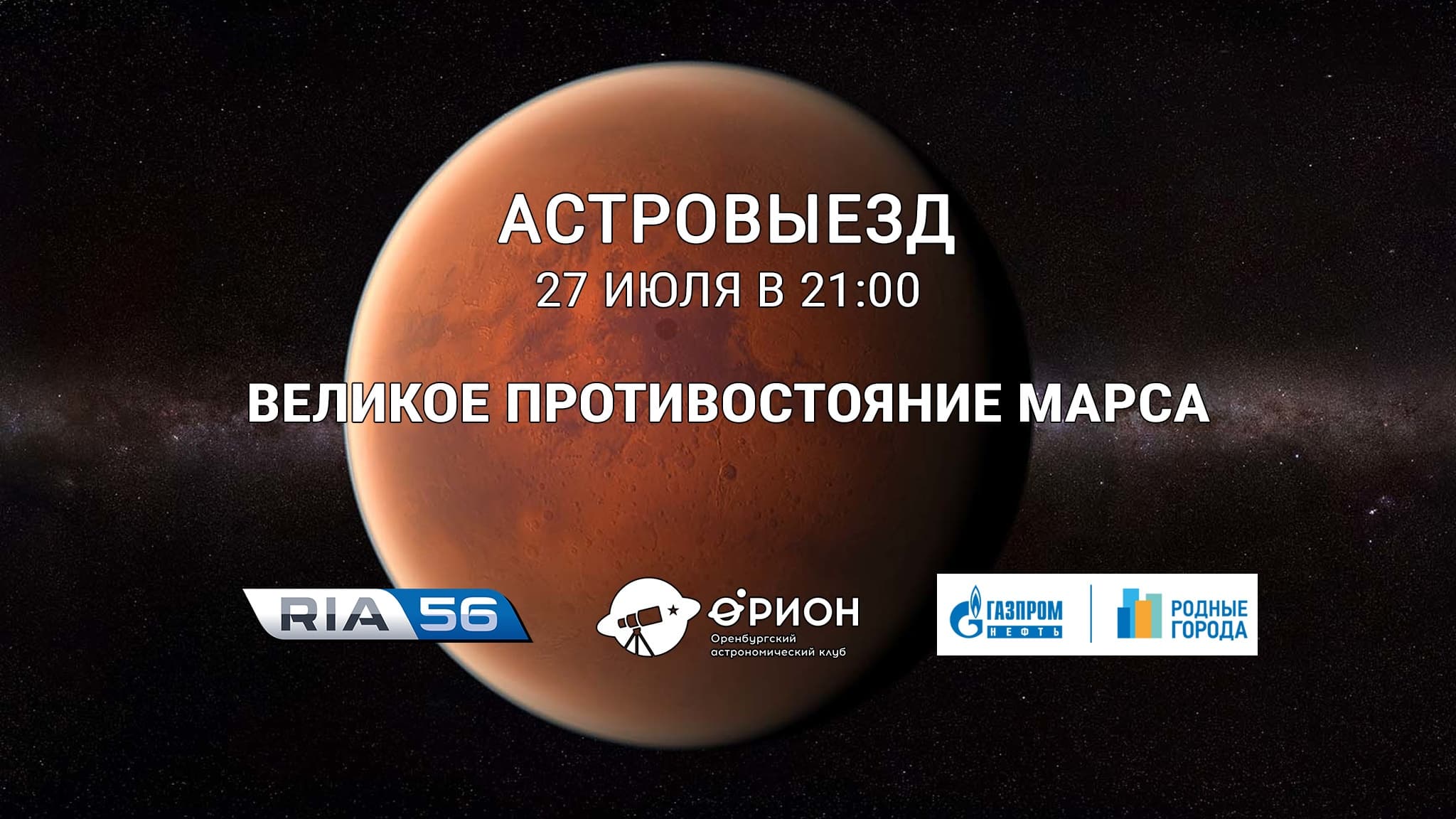
This Friday, July 27, 2018, one of the most anticipated astronomical events of this summer will take place — the Lunar Eclipse and the Great Opposition of Mars!
The night will be unique in that the Lunar Eclipse will be the longest in the 21st century: its duration will be 103 minutes (starting at 00:30 Orenburg time). In addition to the Moon, Mars will approach the Earth at a minimum distance this night — about 57 million km. In favorable weather conditions, even small telescopes will be able to see the structure of the planet's surface.
Our astronomical community, as part of the "Look at the Stars" RIA56 project, with the support of the "Native Cities" program (Gazpromneft-Orenburg), invites everyone to the countryside, to our astronomical site for observations with telescopes! We will tell you about Mars, about lunar eclipses, and show you the summer constellations of the Northern Hemisphere. Of course, we will look through powerful computer-controlled telescopes SW Dob 10" SynScan and SW BK2001 Heq5Pro. The program includes not only Mars and the Moon, but also Jupiter, Saturn, double stars, star clusters, nebulae, and distant galaxies that can be seen through the camera detector.
Event details
Organizers and support
Organizers:
- Orion Amateur Astronomers Club
- RIA56 News Agency Editorial Board
Support:
- Gazpromneft-Orenburg** Social Investment Program "Hometowns"
Event information
Date and time: 07/27/2018, lecture starts at 10:00 PM
Participation conditions:
- Participation is fee-based: 200 rubles per person.
- Children - free.
- It is recommended to have a personal vehicle. If this is not possible, you can find free seats with other participants.
Necessary things:
- A camping mat, foam, blanket or chair for comfortable accommodation.
- Tea, coffee, cookies, candies.
- Warm clothes (it is cold at night).
- Good mood!
How the astro excursion goes:
- The first part of the program is a lecture on astronomy, Mars and lunar eclipses.
- The second part is an excursion to summer constellations, legends and orientation in the sky.
- The third part is observations through telescopes: the Moon, Mars, Jupiter, Saturn, double stars, star clusters, nebulae, galaxies.
Astrovisd Results
Astrovisd was a record-breaking event!
More than 500 people came to the observation deck on Mount Goryun — this is an absolute record for the three years of the project's existence. The chain of cars heading to the meeting place stretched for several kilometers along the Nezhin Highway and the Orsk Highway.
Lectures and stories:
- A lecture about Mars started at 22:00. Participants were told about the features of the red planet, research conducted over decades, and the prospects for its development.
- During the Lunar Eclipse, listeners learned about the mechanism of eclipses and interesting facts about the Moon.
Observations:
-
The program included six telescopes, including SW Dob 10" SynScan and SW BK2001 Heq5Pro.
-
Participants observed Mars, the Moon, Jupiter, Saturn, double stars, star clusters, nebulae and galaxies.
-
When the Moon completely disappeared into the Earth's shadow, the audience greeted this astronomical phenomenon with applause.
Participants' impressions:
"It was the most mysterious and enigmatic night. You just lie in the field and look at the lunar eclipse, at Mars, at the haze of the Milky Way, at the falling stars, and you think that there is a deep, never-before-explored secret of the universe in this."
"This is the second summer that we have been going to Mount Goryun, listening to lectures, looking through telescopes and watching the stars with bated breath. When the Moon completely disappeared into the Earth's shadow, the Milky Way became so bright and incredible that I was even touched."
"The first time we were there with the whole family. We arrived later, when everything was already in full swing. At first I thought it was some kind of rock festival. But it was unforgettable! Only emotions!"
Acknowledgments:
- The organizers express their enormous gratitude to all participants for their active participation and interest in astronomy.
- Special thanks to the "Native Towns" program (Gazpromneft-Orenburg) for supporting the project.
"We are very happy that everything coincided so well today - the end of the work week, the weather conditions, and the two most anticipated astronomical events of this summer: the opposition of Mars and the eclipse of the Moon."
— Sergey Medvedev, project organizer, photographer RIA56.